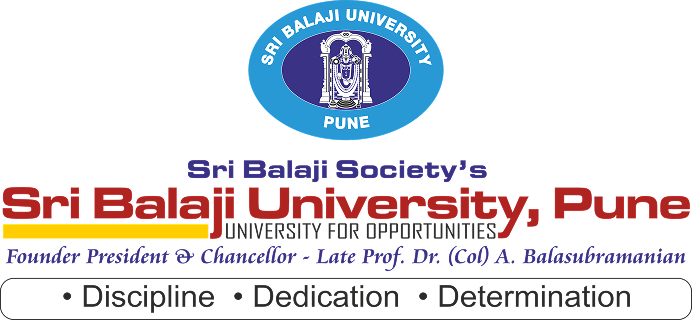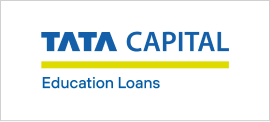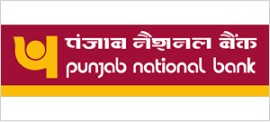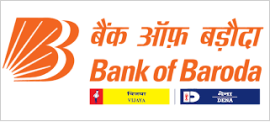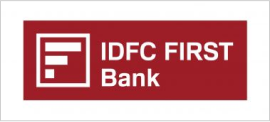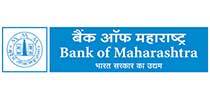Sri Balaji University, Pune (SBUP) stands as a premier institution for management education, renowned for its academic excellence, industry-aligned curriculum, and commitment to student success. Established under the Maharashtra Act No. XII of 2019, SBUP has built upon over two decades of educational experience under the visionary leadership of Late Prof. Dr. (Col) A. Balasubramanian.
Expanding its academic portfolio, SBUP now offers diverse undergraduate programs, including the Bachelor of Business Administration (BBA), under the School of Commerce & Management. These programs equip students with a strong foundation in business principles, strategic thinking, and leadership skills essential for navigating today’s dynamic corporate landscape.
With a focus on experiential learning, industry collaborations, and a research-driven approach, SBUP ensures holistic student development. Its reputation as a center for excellence in management education makes it a preferred destination for aspiring business leaders, offering unparalleled opportunities for academic and professional growth.
At Sri Balaji University, Pune (SBUP), we believe in rewarding merit and encouraging excellence. The School of Commerce & Management (SCM) offers a range of scholarships to support deserving students and make quality education accessible. Scholarships are awarded based on academic excellence, exemplary achievements in sports, and other notable accomplishments in areas such as cultural performance, leadership, or community service. Students with outstanding 10+2 scores or those who have excelled in state/national-level competitions are especially encouraged to apply. These scholarships not only provide financial relief but also act as motivational incentives, empowering students to continue performing at their best. By recognising talent across diverse domains, SBUP ensures that potential is nurtured and success is celebrated.
Specialisations
Following specialisations shall be offered from the third semester onwards. Students can opt for any one of the following specialisations
1. Marketing Management
The Marketing Management specialisation offers students an in-depth understanding of business operations with a particular emphasis on marketing strategies. Covering fundamental to advanced concepts, this program equips students with analytical and strategic thinking skills required to navigate dynamic marketing landscapes. Additionally, the curriculum sensitises students to the societal and environmental aspects of marketing, ensuring ethical and sustainable business practices.
2. Accounting & Finance
The Accounting & Finance specialisation provides a comprehensive study of financial management principles integrated with core business administration concepts. This program equips students with critical skills in financial analysis, risk assessment, and strategic decision-making. With a blend of theoretical knowledge and practical application, graduates are well-prepared for careers in financial consulting, investment management, and corporate finance.
3. Human Resource Management
The Human Resource Management (HRM) specialisation combines general business administration knowledge with specialised training in HR functions. Students gain expertise in talent acquisition, performance management, employee relations, and organisational behaviour. This specialisation prepares graduates for careers in HR consultancy, corporate training, and workforce management, with an emphasis on strategic decision-making and people-centric leadership.
4. Business Analytics
The Business Analytics specialisation equips students with the ability to interpret complex data and derive actionable business insights. This interdisciplinary program integrates data analytics, business intelligence, and strategic management, preparing students for roles in data-driven decision-making. With the increasing reliance on data in corporate environments, graduates will be well-positioned to drive innovation and efficiency in diverse industries.
5. International Business
In an era of globalisation, the International Business specialisation trains students to navigate cross-border trade, international marketing, and cultural diversity in global markets. The curriculum focuses on global trade regulations, foreign exchange management, and international market entry strategies, preparing students for careers in multinational corporations, trade organisations, and global consultancy firms.
6. Entrepreneurship Development
The Entrepreneurship and Development specialisation is designed for students aspiring to start their own ventures or contribute to business innovation. Covering essential topics such as business model development, venture capital, operations management, and business ethics, this program prepares students to identify opportunities, manage risks, and build successful enterprises in competitive markets.
Following specialisations shall be offered from the third semester onwards. Students can opt for any one of the following specialisations
1. Marketing Management
The Marketing Management specialisation offers students an in-depth understanding of business operations with a particular emphasis on marketing strategies. Covering fundamental to advanced concepts, this program equips students with analytical and strategic thinking skills required to navigate dynamic marketing landscapes. Additionally, the curriculum sensitises students to the societal and environmental aspects of marketing, ensuring ethical and sustainable business practices.
2. Accounting & Finance
The Accounting & Finance specialisation provides a comprehensive study of financial management principles integrated with core business administration concepts. This program equips students with critical skills in financial analysis, risk assessment, and strategic decision-making. With a blend of theoretical knowledge and practical application, graduates are well-prepared for careers in financial consulting, investment management, and corporate finance.
3. Human Resource Management
The Human Resource Management (HRM) specialisation combines general business administration knowledge with specialised training in HR functions. Students gain expertise in talent acquisition, performance management, employee relations, and organisational behaviour. This specialisation prepares graduates for careers in HR consultancy, corporate training, and workforce management, with an emphasis on strategic decision-making and people-centric leadership.
4. Business Analytics
The Business Analytics specialisation equips students with the ability to interpret complex data and derive actionable business insights. This interdisciplinary program integrates data analytics, business intelligence, and strategic management, preparing students for roles in data-driven decision-making. With the increasing reliance on data in corporate environments, graduates will be well-positioned to drive innovation and efficiency in diverse industries.
5. International Business
In an era of globalisation, the International Business specialisation trains students to navigate cross-border trade, international marketing, and cultural diversity in global markets. The curriculum focuses on global trade regulations, foreign exchange management, and international market entry strategies, preparing students for careers in multinational corporations, trade organisations, and global consultancy firms.
6. Entrepreneurship Development
The Entrepreneurship and Development specialisation is designed for students aspiring to start their own ventures or contribute to business innovation. Covering essential topics such as business model development, venture capital, operations management, and business ethics, this program prepares students to identify opportunities, manage risks, and build successful enterprises in competitive markets.
- Bachelor of Business Administration (BBA) Program Structure Download PDF
Programme Outcomes
- PO1: Academic Proficiency: Attain academic proficiency and understand the underlying base of the business in order to make effective decisions and plans with fast-changing business needs and demands; they will also be able to understand and apply appropriate tools and techniques to manage business challenges.
- PO2: Continuous Learning and Adaptability: Prepare themselves for upcoming market changes and opportunities by thinking rationally and acquiring critical thinking, conflict resolution, teamwork, delegation, leadership and cross-cultural communication skills.
- PO3: Emotional Intelligence, Social Competence, Empathy and Communication: Understand how to prepare plans and decisions precisely aiming at the attainment of goals; also, they will be able to acquire effective communication skills to create more impactful communication.
- PO4: Critical Thinking and Entrepreneurial Skills: Align their theoretical knowledge skillfully to deal with real-life projects and issues by thinking innovatively while dealing with complex decisions of business.
- PO5: Soft Skill Development / Employability: Accelerate self-empowerment through skill building and hands-on training by participating in industry-based live projects; it will also help them to understand hierarchy in the organisation as a result of improved industry-academia collaboration.
- PO6: Digital Competence: Understand and develop digital literacy and competency required to perform daily work in an organisation
Programme Outcomes
- PO1: Academic Proficiency: Attain academic proficiency and understand the underlying base of the business in order to make effective decisions and plans with fast-changing business needs and demands; they will also be able to understand and apply appropriate tools and techniques to manage business challenges.
- PO2: Continuous Learning and Adaptability: Prepare themselves for upcoming market changes and opportunities by thinking rationally and acquiring critical thinking, conflict resolution, teamwork, delegation, leadership and cross-cultural communication skills.
- PO3: Emotional Intelligence, Social Competence, Empathy and Communication: Understand how to prepare plans and decisions precisely aiming at the attainment of goals; also, they will be able to acquire effective communication skills to create more impactful communication.
- PO4: Critical Thinking and Entrepreneurial Skills: Align their theoretical knowledge skillfully to deal with real-life projects and issues by thinking innovatively while dealing with complex decisions of business.
- PO5: Soft Skill Development / Employability: Accelerate self-empowerment through skill building and hands-on training by participating in industry-based live projects; it will also help them to understand hierarchy in the organisation as a result of improved industry-academia collaboration.
- PO6: Digital Competence: Understand and develop digital literacy and competency required to perform daily work in an organisation
Orientation Program: Diksharambh at Sri Balaji University, Pune
At Sri Balaji University, Pune, every academic journey begins with our comprehensive induction program, Diksharambh, which lays a strong foundation for our students. The program introduces students to the history of Sri Balaji Society, the core values of Sri Balaji University Pune, and the vision and mission that drive our educational philosophy. During the induction, students are also given an overview of the Program Outcomes (POs) and Program Specific Outcomes (PSOs), helping them understand the knowledge and skills they will gain upon completion of their program. Additionally, we present the Graduate Attributes expected from every student, ensuring they are equipped for both academic and professional success. To bridge the gap between academic learning and industry expectations, the induction program features interactions with industry stalwarts, providing valuable insights into the skills and competencies required in the real world. Following the formal induction, we host an extensive Learning from Corporate Session Series lasting one month, where an industry expert addresses students every day, fostering continuous learning and engagement.
Pedagogy: A Structured Approach to Excellence
At Sri Balaji University, we focus on delivering a well-structured and outcome-driven pedagogy that ensures effective learning across all courses. Each subject is meticulously designed, with clear Course Outcomes (COs) based on Bloom’s Taxonomy—a framework that classifies learning objectives into six levels: Remembering, Understanding, Applying, Analyzing, Creating, and Evaluating. Faculty members tailor their sessions to help students develop the necessary skills at each of these levels, fostering a deeper understanding of the subject matter.
The evaluation process at the university is comprehensive and closely aligned with the course outcomes, ensuring that both concurrent assessments and term examinations reflect the learning objectives specified in the course syllabus. Every assessment, whether it is a class activity or a formal exam, is mapped to the relevant course outcomes, ensuring consistency and clarity in evaluation.
Key Initiatives for Effective Teaching-Learning
To enhance the teaching-learning experience, the university has
implemented
several initiatives:
-
Session Plans:
Before the academic sessions begin, students receive a detailed session plan outlining the program structure, session-wise content, pre-reading, post-reading materials, and assignments. This allows students to prepare effectively for each class, ensuring a more engaging and productive learning experience. -
Harvard Business Review (HBR) Case Studies:
As part of our pedagogical approach, we incorporate HBR case studies into various courses. These case studies—both long and short—are designed to help students tackle real-world business challenges. Our faculty, trained by professors from the Indian Institute of Management Ahmedabad (IIMA), are equipped to guide students through these case studies, fostering critical thinking and problem-solving skills. -
Coursera & EdX Courses
Sri Balaji University provides access to a wide range of Coursera and EdX modules, aligned with course content. These online courses serve as an internal component of the program, offering students the opportunity to earn additional certificates and gain relevant knowledge and skills recognized globally. -
Cesium Simulation:
To provide a hands-on learning experience, we have introduced Cesium Simulation for various courses. Our faculty members, trained in simulation-based teaching methods, guide students through case studies, helping them understand complex business dynamics and decision-making processes in a controlled, simulated environment. -
Research Paper Writing
At Sri Balaji University, we integrate Research Paper Writing into the academic journey starting from the second semester. Students are required to choose a specific topic and submit their research paper by the third semester. In the second semester, students begin the groundwork on their chosen topic and are assigned a faculty guide for expert advice on research methods and paper writing. The aim is to equip students with the necessary skills to conduct independent research and present their findings effectively. At the end of this process, students are expected to present their research at conferences or submit their papers for publication in recognized research journals. -
Company Project Study (CPS)
After completing the second semester, students embark on a Company Project Study (CPS), a compulsory component of the curriculum. This involves a two-month live project with an industry partner, where students select a relevant topic and conduct in-depth research within a real-world corporate environment. Throughout this period, students engage with industry professionals to gain insights and apply their academic learning to practical scenarios. At the end of the project, students submit a detailed report to the university and undergo a Viva presentation, where their findings and insights are evaluated. The CPS provides invaluable industry exposure and serves as a bridge between academic learning and practical application. -
Case Study Writing
In the fourth semester, students are required to write a Case Study on an organization or business unit. For this task, a faculty guide is assigned to each student to provide guidance on structuring the case study and conducting thorough research. The case study is meant to develop critical thinking, problem-solving, and analytical skills by exploring real business challenges. Upon completion, students submit their case study report, which is then evaluated through a One-on-One Viva. The evaluation focuses on various aspects such as the depth of research, analytical skills, and the ability to present solutions to organizational issues. This activity is an essential part of the program, designed to enhance students' practical understanding of business dynamics.
Industry-Centric Learning Opportunities
Alongside the core curriculum, Sri Balaji University focuses on providing students with skills that align with industry needs through several initiatives:
-
Value-Added Courses (VACs):
In collaboration with industry experts, we offer Value-Added Courses that complement the regular academic curriculum. These courses are designed to build specialized knowledge and enhance students' skill sets, helping them stay ahead in the competitive job market. -
Outbound Activities:
We organize outbound activities that foster team building, leadership, and interpersonal skills. These activities encourage students to step out of their comfort zones, build confidence, and develop a holistic set of skills required for personal and professional growth.
By combining traditional academic learning with industry-oriented activities, simulations, and case studies, Sri Balaji University ensures that students are well-prepared to excel in their careers. Our approach to pedagogy and continuous industry engagement ensures that students receive a rich, comprehensive educational experience, equipping them with the tools to thrive in a dynamic world.
All 3 Credit and some 2 Credit courses will have 50% internal component and 50% component as external [University] examination. All 1 and 6 Credit and some 2 credit Course will have Internal component for evaluation.
STANDARD OF PASSING
The total weightage (100%) for some subject is equally divided (50/50) between Internals and End Term Examinations and some subjects are totally evaluated by internal component. Students are expected to obtain a minimum of 40% of marks in the internals and the End Term Examinations individually to be considered as pass in the particular subject. Sri Balaji University, Pune follows grading system for awarding grade and grade points to students. It follows 10 point grade scale, SCPA and CGPA are calculated as the weighted average of grade point multiplied by the credits for the courses. The system of evaluation will be as follows: For each course, the score of internal assessment and the End term examinations will be added together and then converted into a grade and grade point average. A student shall be said to have earned the credits for the course if he/she earns minimum of 40% marks in internals and End term examinations separately. Grade point less than 4.00 will be treated as grade F (fail). Results will be declared for each semester and the final grade–sheet will give total grades and grade point
Eligible students can apply online. CLICK HERE TO APPLY.
We're Working on It! Content Will Be Updated Shortly
Admission Process
Application Process:
Prospective students who meet the eligibility criteria can submit their applications online (CLICK HERE TO APPLY).
Admission Procedure:
After reviewing the submitted applications, shortlisted candidates will be notified about the schedule for their Personal Interview (PI).
- Personal Interview (PI):
Experts will evaluate applicants based on multiple parameters, including their suitability for the chosen specialisation.
Selection Criteria
The final merit list for admission will be prepared based on:
- 50% weightage for marks obtained in the HSC/qualifying examination
- 50% weightage for performance in the personal interview
The University reserves the right to modify the admission process as necessary.
Application Process:
Prospective students who meet the eligibility criteria can submit their applications online (CLICK HERE TO APPLY).
Admission Procedure:
After reviewing the submitted applications, shortlisted candidates will be notified about the schedule for their Personal Interview (PI).
- Personal Interview (PI):
Experts will evaluate applicants based on multiple parameters, including their suitability for the chosen specialisation.
Selection Criteria
The final merit list for admission will be prepared based on:
- 50% weightage for marks obtained in the HSC/qualifying examination
- 50% weightage for performance in the personal interview
The University reserves the right to modify the admission process as necessary.
No FAQs available at the moment.
Refund Rules
| Sr. No. | % of refund of fees * | Point of time when notice of withdrawal of admission is received in the Schools of the University |
|---|---|---|
| 1. | 100%** | 15 days or more before the formally-notified Commencement of Courses. |
| 2. | 90% | Less than 15 days before the formally-notified Commencement of Courses. |
| 3. | 80% | 15 days or less after the formally-notified Commencement of Courses. |
| 4. | 50% | 30 days or less, but more than 15 days, after formally-notified Commencement of Courses. |
| 3. | 00% | More than 30 days after formally-notified Commencement of Courses. |
*Caution money or security deposit, which are not part of the fees chargeable, shall be refunded in full.
** In case of (1) in the table above, the entire fee after the deduction of the processing fee of not more than Rs. 1000/- shall be refunded to the student by the University/concerned Institution
Click to Apply Online, Click Url
Eligibility
- A candidate from any stream, should have passed the 12th Standard Examination (HSC 10+2) with a minimum of 50% of marks and English as a passing subject.
OR
- Three-Year Diploma Course from the Board of Technical Education, conducted by the Government of Maharashtra or its equivalent, after SSC, i.e. 10th Standard.
OR
- Two Years Diploma Course in Pharmacy from the Board of Technical Education, conducted by the Government of Maharashtra or its equivalent, after HSC, i.e. 12th Standard.
OR
- Completed MCVC program. (Minimum Competency Vocational Courses)
- A candidate should have scored a minimum of 50% marks in qualifying examination. (Minimum 45% for SC/ST candidates)
- A candidate from any stream, should have passed the 12th Standard Examination (HSC 10+2) with a minimum of 50% of marks and English as a passing subject.
OR
- Three-Year Diploma Course from the Board of Technical Education, conducted by the Government of Maharashtra or its equivalent, after SSC, i.e. 10th Standard.
OR
- Two Years Diploma Course in Pharmacy from the Board of Technical Education, conducted by the Government of Maharashtra or its equivalent, after HSC, i.e. 12th Standard.
OR
- Completed MCVC program. (Minimum Competency Vocational Courses)
- A candidate should have scored a minimum of 50% marks in qualifying examination. (Minimum 45% for SC/ST candidates)
- NEP 2020 Inspired & IKS Integrated Curriculum
- Qualified Faculty with Diverse Experiences
- Out-of-the-Classroom Learning Opportunities
- Exceptional Industry Connect
- Competitive Fee Structure
BBA - 2026-30 BATCH - FEES STRUCTURE
| BBA 1st Year | 1st Instalment | 2nd Instalment | 3rd Instalment | Total |
|---|---|---|---|---|
| Academic Fees | Rs. 30,000 | Rs. 61,125 | Rs. 51,125 | |
| (Refundable Deposit) | Rs. 10,000 | - | ||
| Total (1st Year) | Rs. 30,000 (Within a week from the date of result declaration) |
Rs. 61,125 (At the time of commencement of course) |
Rs. 61,125 (18 December-2026) |
Rs. 1,52,250 |
| BBA 2nd Year | 4th Instalment | 5th Instalment | Total | |
| Academic Fees | Rs. 66,125 (Before the commencement of third semester) |
Rs. 66,125 (18 December-2027) |
Rs. 1,32,250 | |
| BBA 3rd Year | 6th Instalment | 7th Instalment | Total | |
| Academic Fees | Rs. 69,875 (Before the commencement of fifth semester) |
Rs. 69,875 (18 December-2028) |
Rs. 1,39,750 | |
| BBA 4th Year | 8th Instalment | 9th Instalment | Total | |
| Academic Fees | Rs. 65,125 (Before the commencement of seventh semester) |
Rs. 66,125 (18 December-2029) |
Rs. 1,32,250 | |
| Total Fee | Rs. 5,56,500 |
Hostel Fees* (Optional) - Rs. 1,20,000/-
Note : Uniform fee not included in the fees structure.
Refund Rules
| Sr. No. | % of refund of fees * | Point of time when notice of withdrawal of admission is received in the Schools of the University |
|---|---|---|
| 1. | 100%** | 15 days or more before the formally-notified Commencement of Courses. |
| 2. | 90% | Less than 15 days before the formally-notified Commencement of Courses. |
| 3. | 80% | 15 days or less after the formally-notified Commencement of Courses. |
| 4. | 50% | 30 days or less, but more than 15 days, after formally-notified Commencement of Courses. |
| 3. | 00% | More than 30 days after formally-notified Commencement of Courses. |
*Caution money or security deposit, which are not part of the fees chargeable, shall be refunded in full.
** In case of (1) in the table above, the entire fee after the deduction of the processing fee of not more than Rs. 1000/- shall be refunded to the student by the University/concerned Institution
Following specialisations shall be offered from the third semester onwards. Students can opt for any one of the following specialisations
1. Marketing Management
The Marketing Management specialisation offers students an in-depth understanding of business operations with a particular emphasis on marketing strategies. Covering fundamental to advanced concepts, this program equips students with analytical and strategic thinking skills required to navigate dynamic marketing landscapes. Additionally, the curriculum sensitises students to the societal and environmental aspects of marketing, ensuring ethical and sustainable business practices.
2. Accounting & Finance
The Accounting & Finance specialisation provides a comprehensive study of financial management principles integrated with core business administration concepts. This program equips students with critical skills in financial analysis, risk assessment, and strategic decision-making. With a blend of theoretical knowledge and practical application, graduates are well-prepared for careers in financial consulting, investment management, and corporate finance.
3. Human Resource Management
The Human Resource Management (HRM) specialisation combines general business administration knowledge with specialised training in HR functions. Students gain expertise in talent acquisition, performance management, employee relations, and organisational behaviour. This specialisation prepares graduates for careers in HR consultancy, corporate training, and workforce management, with an emphasis on strategic decision-making and people-centric leadership.
4. Business Analytics
The Business Analytics specialisation equips students with the ability to interpret complex data and derive actionable business insights. This interdisciplinary program integrates data analytics, business intelligence, and strategic management, preparing students for roles in data-driven decision-making. With the increasing reliance on data in corporate environments, graduates will be well-positioned to drive innovation and efficiency in diverse industries.
5. International Business
In an era of globalisation, the International Business specialisation trains students to navigate cross-border trade, international marketing, and cultural diversity in global markets. The curriculum focuses on global trade regulations, foreign exchange management, and international market entry strategies, preparing students for careers in multinational corporations, trade organisations, and global consultancy firms.
6. Entrepreneurship Development
The Entrepreneurship and Development specialisation is designed for students aspiring to start their own ventures or contribute to business innovation. Covering essential topics such as business model development, venture capital, operations management, and business ethics, this program prepares students to identify opportunities, manage risks, and build successful enterprises in competitive markets.
All programs run under the aegis of the Sri Balaji University are specially approved for education loan from Propelld , Tata Capital , Punjab National Bank , Axis Bank , Bank Of Baroda , IDFC First Bank , Credenc , AVANSE , and Bank Of Maharashtra
Sri Balaji University, Pune has signed MoUs with these banks. An education loan can be availed from any of the mentioned banks/NBFCs. However, students have the liberty to approach any other bank as per their convenience.
| Application Form Available from | 08th January, 2026 |
| Last Date to Apply | 31st March, 2026 |
| Admission Process Starts | First Week of February, 2026 |
| Commencement Date | 18th July, 2026 |
Frequently Asked Questions
Sri Balaji University, built on the pillars of Discipline, Determination, and Dedication is an ongoing endeavour to transform raw talent into future corporate managers who can effectively handle corporate challenges and take businesses to greater heights.
- 26 Years of strong legacy of management education
- Become All Round Manager with our Industry ready MBA Programs
- 1st Among Top Pvt. Universities in Maharashtra
- 4th Among Top Pvt. Universities in India
- MOU’s signed with Industry Leaders
- 23000+ Strong Alumni Network
- 100% Placement Recorded
- 9 in Demand Specializations
- Sri Balaji Society (SBS) was established in the year 1998 by Late. Professor Dr. (Col) A. Balasubramanian; is also the Founder and Chancellor of Sri Balaji University Pune (SBUP). Sri Balaji Society shifted to its present location in Tathwade, Pune in the year 2006. It is the dedication and vision of our founder which helped us achieve the status of a university in 2019.
- A Private University established in 2019 and deemed to have been established under Section 6 (4) of the Maharashtra Private Universities (Establishment and Regulation) Act ,2023.
Sri Balaji University, Pune (SBUP) comprises four Constituent Management Institutes:
- Balaji Institute of Modern Management (BIMM)
- Balaji Institute of Technology and Management (BITM)
- Balaji Institute of International Business (BIIB)
- Balaji Institute of Management and Human Resource Development (BIMHRD)
Constituent Schools:
- School of Computer Studies (SCS)
- School of Commerce & Management (SCM)
- School of Humanities & Social Science (SHSS)
- Balaji School of Law (BSL)
- School of Liberal Arts (SLA)
- School of Acturial Science (SCM)
- Balaji School of Sports Sciences(BSSS)
- School of Defence Studies (SDS)
Other Initiative:
- Research and Development Cell (Ph.D.)
- SRI Build (MDP Department)
- Srujan (Entrepreneurship development & Incubation Centre)
Courses Offered
- MBA ( Master of Business Administration )
https://www.sbup.edu.in/About/aicte_approvals
https://www.sbup.edu.in/About/aiu_membership
With immense pleasure, we announce that w.e.f. 1st April 2022 Sri Balaji University, Pune, has become an esteemed member of the Association of Indian Universities (AIU)
Be a UGC-recognized university graduate with at least 50% aggregate marks (45% for reserved category) SC/ST
Candidates in the final year of Graduation/Degree can also apply, however the admission will be granted provisionally.
It is imperative that the candidate should have taken at least one exam out of CAT/MAT/XAT/CMAT or MH-CET. MAT exams held after Aug/Sept 2024 to May 2025 will be considered for admission to the academic year 2025-27.
- Please click on the below link
- https://admissions.sbup.edu.in/mba/?utm_source=SBUP+Website&utm_medium=Admission+Page&utm_campaign=Organic
- The application fee for MBA programs is generally around ₹1,000,
- For SBEST (Sri Balaji Entrance Screening Test) ₹490/-
We have four-seater rooms. Hostel accommodation is provided on First-Come-First-Serve basis restricted to first year only for the period June to April. Preference will be given to outstation students. Hostel allotment will be done only on the basis of receipt of the requisite fee of Rs. 91,500/- (Rupees Ninety-One Thousand Five Hundred only). A mere telephone call or request through email will not be accepted. Complimentary Breakfast and Lunch will be provided to Hostel Students.
Sri Balaji Entrance Screening Test (SBEST) is
an
entrance exam conducted by Sri Balaji
University,
Pune
(SBUP)
The entrance exam is optional in nature. Students should
take
this entrance exam under the following conditions.
Did not appear for CAT /MAT/ XAT/ CMAT/ MAH-CET
To improve the scores of the above-mentioned exams attempted, can opt for SBEST.
Please click on the link below to know more about Test Structure & Exam Schedule
https://sbest.sbup.edu.in/?utm_source=SBUP+Website&utm_medium=Admission+Page&utm_campaign=Organic
SBUP offers a range of programs, including:
- Marketing Management
- Personnel Management Human Resource development
- Finance
- International Business
- Operations and supply Chain Management.
- Product Management and Business analytics
- Digital Marketing and Business Analytics
- Telecom and Business Analytics
- Data Science and Business Analytics
- The MBA program is a two-year, full-time course spread across four semesters.
https://www.sbup.edu.in/Campus_life/about_campus
SBUP has a modern campus with facilities including:
- State-of-the-art classrooms and lecture halls
- A well-stocked library
- Computer labs
- Sports and recreation facilities
- Hostel accommodations for students
- Lively on Hostel Campus
- Deep Corporate Connections
- Mess and Cafeteria Facility
- Action Packed Sports Facility
- Buzzling College fest
- Vibrant Cultural Celebrations
- Student Club Activity
- NSS Scheme.
- MDP
- Guest Lectures
- Leadership Training
- National Business convention
- Special Guest Visit
- Induction Programme
- AV Production Studio
- Auditorium for more than1000 Capacity
- Cesim- Business Solutions
- T-edX
- Coursera
- LinkedIn Learning
- Harvard Business Review
- SBUP has a dedicated placement cell that assists students in securing placements. The university has partnerships with various reputed companies, providing students with good placement opportunities.
- 350+ companies visit for placements
- Strong corporate Connections
- The average package for MBA graduates 8.75 lac per annum, while the highest packages can go up to 21.58 lac per annum. However, these numbers vary each year.
- Top 10% Average Package 11.75 LPA
- Top 20% Average Package 10 LPA
- Yes, internships are an integral part of the curriculum, and SBUP assists students in finding relevant internships to gain practical experience.
Entrepreneurship Development and Incubation Centre (EDIC) is a hub for nurturing and supporting start-ups and entrepreneurs. The centre provides a conducive environment, resources, mentoring, and networking opportunities to foster the growth and success of innovative ventures.
- SBUP offers scholarships based on merit and need-based criteria. Scholarships may also be available through government schemes and external bodies.
- https://www.sbup.edu.in/Admission/Scholarships
- While SBUP itself may not provide direct financial aid, students can avail of educational loans from banks. The university can provide necessary documentation to support loan applications.
- https://www.sbup.edu.in/Admission/education_loan
- You can reach out to the SBUP admissions office via the official website or by contacting them at the phone number or email address provided on the site.
- Address: Survey No. 55/2-7, Tathawade, Off Mumbai -Bangalore Bypass, Pune 411033, Maharashtra, India.
- Contact No.: 08069591888
- Email Id : admissions@sbup.edu.in
https://www.sbup.edu.in/Admission/important_contacts

